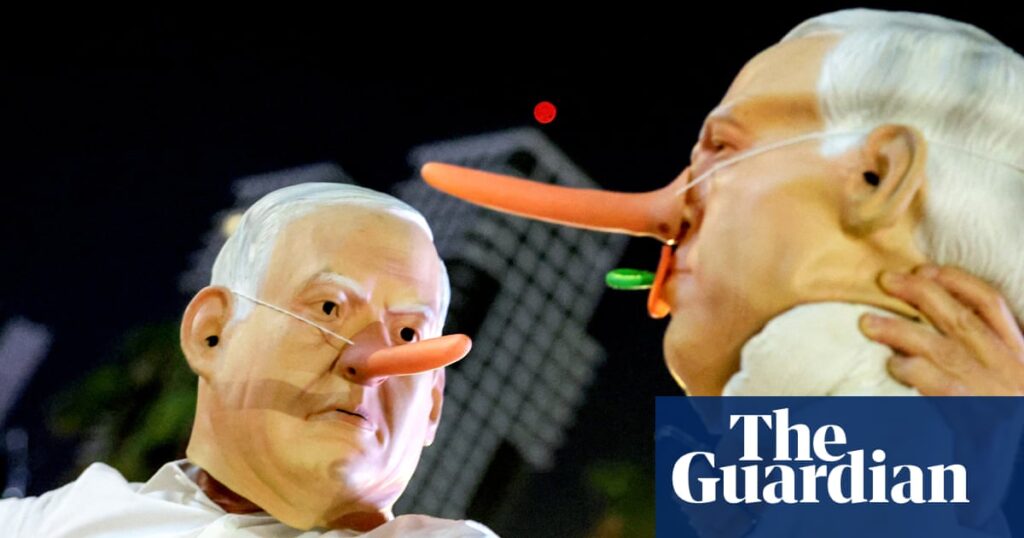Benjamin Netanyahu repeated his pledge to force Hamas to disarm on Friday in a defiant and combative speech, just an hour after a ceasefire began in Gaza.
In a televised address, Israel’s prime minister said he had resisted intense domestic and international pressure to achieve his aim of ensuring “the security of Israel”, lambasted his critics and reiterated a threat to return to war if necessary.
“Hamas agreed to the deal only when it felt the sword resting on its neck and it is still on its neck … Hamas will be disarmed and Gaza will be demilitarised … If this is achieved the easy way, so much the better. And if not, it will be achieved the hard way.,” Netanyahu said.
The deal signed early on Thursday and implemented on Friday will lead to Hamas releasing 20 living hostages within 72 hours, the withdrawal of Israeli forces from parts of Gaza, and freedom for about 2,000 Palestinian prisoners held in Israeli jails. Further steps are still unclear.
In his address, Netanyahu said that achieving security for Israel meant “breaking the Iranian axis, of which Hamas is a central component”, suggesting that he had achieved this over the 24 months of relentless conflict.
Analysts described the speech as “an election speech”.
“He is always campaigning. In every speech it is: ‘I ordered this’, ‘I ordered that’. It’s always me, me, me … That’s what he does best,” said Yossi Mekelberg, a specialist in Israeli politics at London’s Chatham House thinktank.
Netanyahu’s popularity has not recovered substantially since the 7 October 2023 surprise Hamas raid that triggered the war in Gaza. The attack killed 1,200, mostly civilians, with another 250 taken hostage. Since then, even slight boosts for Netanyahu and his Likud party after military campaigns against Hezbollah in Lebanon last year and Iran in June have come only at the expense of other members of the current ruling coalition, the most right wing in Israel’s history.
Elections in Israel are due within about a year, but most observers expect them within six months. The most recent survey, published on Friday by Ma’ariv, an Israel newspaper, showed widespread support for the ceasefire and hostage release among Israelis had boosted Likud by only two seats, and that the current coalition would still face defeat by a wide margin.
Far-right ministers, who have long sworn to collapse the current government if the war was brought to an end without the total destruction of Hamas and Israeli control of all of Gaza, have so far yet to make good their threat. In the Ma’ariv survey, almost half of respondents wanted a vote as soon as possible.
“Bibi [a widely used nickname for Netanyahu] has been forced to accept this is the end of the war, even if he won’t use those specific words … so now he is going to make the best of the situation. Everything is good for Bibi,” said Anshel Pfeffer, The Economist’s Israel correspondent and biographer of Netanyahu.
“Even at 75, he cannot conceive of life outside the prime minister’s office … and [to hold on to power] would be a vindication as the man who destroyed the Iranian axis, not the man responsible for October 7. I don’t think there is a scenario where he goes off to look after his rosebushes.”
The coming weeks will bring further challenges for Netanyahu, who has held power in Israel for 18 years in total, longer than David Ben Gurion, considered the country’s founding father. He faces corruption charges that could lead to a ban on public office or even jail, and will also face new calls for a full judicial inquiry into the failures that allowed for Hamas’s 2023 raid. Any ceasefire in Gaza is likely to be fragile, and implementing thornier parts of Trump’s plan, including many elements that favour Israel, will be extremely difficult.
The key for Netanyahu will be to convince Israelis that he remains “Mr Security” despite the worst security disaster in the country’s history occurring on his watch. The ringing endorsement Donald Trump is expected to offer when he speaks to the Knesset, Israel’s parliament, on Monday will help.
“Netanyahu is the central story of this war … Today, Israel finds itself in the strongest security position in its history: there is no Syrian threat, Hezbollah has suffered a severe blow, and so have Iran and Hamas. Netanyahu’s likely message will be: we fell asleep, but we rose in full force – and we defeated all of Israel’s enemies,” said Udi Tenne, a strategic adviser and international campaign manager, who has worked with top leaders in Israel.
Despite the costs of the war in Gaza, Israel’s international isolation and domestic divisions, the broader political landscape may still favour Netanyahu. Any opposition is fragmented.
Lahav Harkov, a senior political correspondent at the US-based Jewish Insider, said Israel and its politicians had shifted to the right.
“Israelis don’t seem to have much of an appetite for the peacenik stuff at the moment,” Harkov said. “It may not seem logical, but the central question in Israeli politics is still the same as it has been for a long time: yes Bibi, or no Bibi?”

